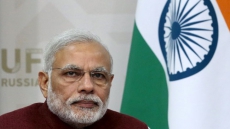Scottish historian and award winning author William Dalrymple recreated his latest work, "The Anarchy" at the launch of a seven-city book tour here, contending that the East India Company (EIC), which later morphed into the British Raj, was the "greatest corporate coup in history".
But, has he stirred a controversy by contending that this was fuelled by the Marwari businessmen of Bengal?
"This will come as a surprise to most Indians, but Marwari businessmen and their capital aided the East India Company," Dalrymple said adding that the EIC and the businessmen "came from different lands and spoke different languages but they both understood the common language of accounts and profit".
The Marwaris "knew that their capital would be safe with the Company", he maintained before a packed audience at The Imperial hotel here on Thursday evening.
Why would the Marwaris side with the EIC, was there no sense of patriotism, his interlocutor, journalist Vir Sanghvi, asked during a tête-à-tête after Dalrymple unveiled, with the aid of a slide show, the basic elements of "The Anarchy".
The Marwaris, as also the Indian "elite" of the time, realised that the Mughal empire was crumbling and switched to the winning side.
"It would be like voting for the Congress...you know they're not going to win," Dalrymple said amidst much laughter in a reference to the 2004 general elections that saw the Grand Old Party voted out of power by the Bharatiya Janata Party.
"The Company seemed to be on the winning side and it made business sense to keep it happy," the author said.
He also ascribed the fall of the Mughal empire largely to Mohammad Shah Rangeela (1719-48).
"Delhi, at the time, was the biggest city between Istanbul and Tokyo. It was an overripe mango waiting to be picked and Nadir Shah (the founder of Persia's Afsharid dynasty) was the first to strike. Despite being heavily outnumbered, he defeated the Mughal army (at what is now the city of Karnal). He then invited Rangeela for lunch and the idiot accepted. He then stayed in Delhi for a while and departed with wagon-loads of wealth, including the Peacock Throne," Dalrymple said.
Many historians believe that had Nadir Shah not invaded India, the history of the Mughal empire, as also that of British colonial rule in India, could have been quite different.
"The East India Company remains today history's most ominous warning about the potential for the abuse of corporate power - and the insidious means by which the interests of shareholders can seemingly become those of the state. For, as recent American adventures in Iraq have shown, our world is far from post-imperial, and quite probably will never be," the book says.
Imperialism is transforming itself into forms of global power that use campaign contributions and commercial lobbying, multinational finance systems and global markets, corporate influence and the predictive data harvesting of the new surveillance -capitalism rather than - or sometimes alongside - overt military conquest, occupation or direct economic domination to effect its ends.
"Four hundred and twenty years after its founding, the story of the East India Company has never been more current," Dalrymple writes.
"We still talk about the British conquering India, but that phrase disguises a more sinister reality. It was not the British government that began seizing great chunks in India in the mid-eighteenth century, but a dangerously unregulated private company headquartered in one small office, five windows wide, in London, and managed in India by a violent, utterly ruthless and intermittently mentally unstable corporate predator - (Robert) Clive. India's transition to colonialism took place under a for-profit corporation entirely for the purpose of enriching its investors," the book says.
"The Company's conquest of India almost certainly remains the supreme act of corporate violence in world history. For all the power wielded today by the world's largest corporations - whether ExxonMobil, Walmart or Google - they are tame beasts compared with the ravaging territorial appetites of the militarised East India Company," Dalrymple writes.
The book tour will take Dalrymple to Bengaluru, Mumbai, Pune, Kolkata, Chennai and Kochi before concluding on October 22.
